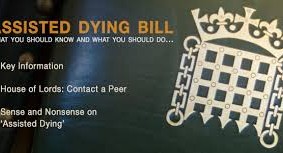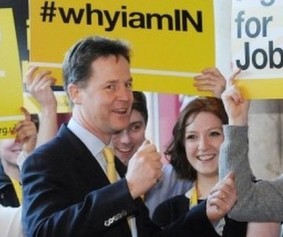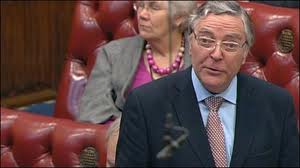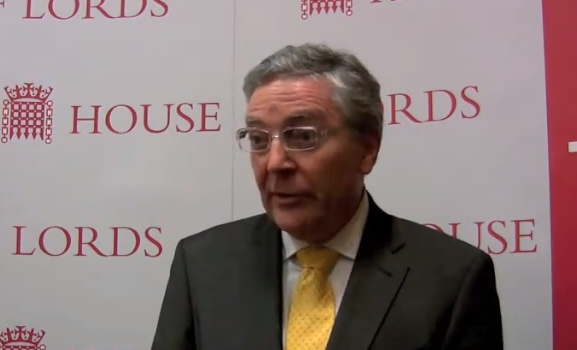Government Rides to Rescue of Levy
With excellent timing in the Year of the Horse and just before the opening of the Cheltenham Festival, following pressure mainly from Coalition parties (Viscount Astor, Lord Mancroft, myself and others) and the Crossbenches (Viscount Falkland) the Government announced on Report Stage in the House of Lords that they would be inserting a new clause in the Gambling (Licensing and Advertising) Bill at Third Reading to enable the Horserace Betting Levy to be extended to include offshore bookmakers who do not currently pay the Levy. This has now taken place.
With the value of the Levy having fallen drastically in recent years (from £106m in 2003/4 to £66.7 m in 2012/13) this is very good news for horse racing which is this country's second most popular sport, with 5.6 attendees at events in 2012, and which makes a substantial contribution to the UK economy.
Why I am against the Assisted Dying Bill
Sadly I am unable to be present for and take part in the Debate on the Second Reading of the Assisted Dying Bill this Friday and I have been unable to reply to the huge volume of correspondence but I want to put my views on record beforehand
Some colleagues have changed their minds on the subject since Lord Joffe's Bill came to parliament a few years ago. I have not.
The Bill is designed allow doctors to give lethal drugs to adults thought to be mentally competent and diagnosed with less than six months to live.
There are many who view the safeguards in the Bill as inadequate and the systems to tackle undue influence inadequate . Mine are more fundamental-the inability of doctors and modern medicine to be at all sure about prognosis and life expectancy.
My late wife Dr Vicky Clement-Jones for example was given 3 months to live with late stage Ovarian Cancer but survived for 5 years and in that time established Cancer Bacup's Cancer Information Service now run by Macmillan Cancer Support.
This is an extract from Dr Ruth Johnston to Lord Carey, formerly Archbishop of Canterbury which sums up my thoughts entirely:
I write as a doctor working in oncology, with relation to the article you authored in the 'Daily Mail' on 12th July 2014.
I work primarily with patients who have lung cancer. The majority of these patients have Stage IV (metastatic) disease, which is inoperable and incurable, and in whom the median survival is generally of the order of 6 months.
I offer my patients the opportunity to discuss prognosis, and if they want to know this information, I explain that median survival is the time when 50% of patients (with their particular disease type and stage) are alive and 50% are dead. I always explain that predicting survival times is difficult and that some patients do much better than their doctors initially expect. I still review several patients who were originally considered by their oncologist to have a prognosis of less that one year, yet who are alive between 3-5 years after the initial diagnosis.
I write this to explain that determining prognosis, even in a quite predictable disease such as cancer where there are survival statistics available, is difficult, non-exact, and prone to error even among the most experienced practitioners. It is important to recognise that there can be a considerable range of survival times and that long term survivors are known in patients assessed by an oncologist and considered to have 'terminal cancer'.
The ability to determine prognosis in other diseases, such as progressive neurological diseases, chronic heart, lung or kidney disease etc. is much more difficult, and prediction of survival times is prone to even more significant error.
In a Bill which allows there certifying doctors no requirement to know the patient in question, I think it is unlikely that a doctor who has not met the patient can provide accurate information on prognosis for differing disease types and stages.
I have reflected on the effect implementation of an Assisted Euthanasia Bill would have on my practice: while advising a patient with Stage 4 lung cancer of their diagnosis and treatment options and providing prognostic information, my patient and I would be aware that the an assisted death would be a possible 'option' given their short survival times (i.e. as per the proposed Bill 'reasonably expected' to die within six months). I think that an 'assisted dying' option would negatively impact my relationship with my patient, who might fear that I and the other health professionals involved in their care might not offer the full options of treatment available, or that by discussing survival times doctors might have the motive of opening up the patient's consideration of assisted dying.
Symptoms of fatigue, depression and, not infrequently, disability, are often seen in patients with advanced malignancy. Assisted dying is conceivably going to be offered to patients who have the potential for reversibility of symptoms and alleviation of distress with the help of (among others) oncology, palliative medicine and general practitioner services. I am concerned that my cancer patients who often have understandable anxiety and depression at their diagnosis, may fear being a burden to their family and the health service, and choose an assisted death. A painful death or terminal suffering is not common in cancer patients: raising the fear of the death process may cause my lung cancer patients to feel they should end life early, rather than risk a difficult death.
To me the Bill is completely perverse to a medical practitioner. I trained and practice in medicine to help patients, to preserve life and to 'first do no wrong'. Killing is wrong, and it is wrong to ask a doctor to prescribe a deliberately lethal dose of medicine, while also anticipating the same doctor will care and cure.
Speech on startups gets a response!
The day after my creative industries speech I was delighted to receive the following email from Care Home Owner David Crabtree. As I said to him "You inspire me back. It's really good to know someone is listening! Please do persevere with your project"
Dear Lord Clement - Jones
By chance as I switched on my TV this morning at 6 a.m as you were delivering a speech and outlining the many resources for funding and encouragement of digital and other media start ups.
Your speech was inspiring, very informative, and extremely well delivered as I would normally have skipped the TV channel.
I have been nursing for over forty years and whilst many were spent in the field of addiction working with alcohol and drug dependents and their families, I started out and now finish my career working with people and their families who suffer from dementia.
Many are under 60 and their dementia, Korsakoffs has been brought about primarily by the addiction to alcohol.
It is in doing this work, I have been trying to source a digital watch which will alert the family member to someone leaving the home, combined with a gps tracking system which will locate the watch and it's wearer should they go beyond a pre set parameter.
Many years ago I was a nurse in a ward where someone wondered off and despite police helicopters and tracker dogs they were found dead some three days later. The police resources we spend looking for people with dementia is very costly.
I have now sourced one in the UK but the costs may be too prohibitive at the moment for general use, which is why your speech was so informative and timely.
In working as a counsellor with addiction and families one never knows if the information you give out will be of any use, as it can take many years and attempts to get clean, as I know only too well from person experience, so the saying in AA is that a flower never sees the seed.
Today your speech has inspired me to see if the technology and start up funding for the watch is available in the UK, and I wanted to both acknowledge your work and thank you.
My best wishes to you and your family , and should you come North meeting for coffee would be a great pleasure for me.
Many thanks again for all the work you do on behalf of so many of us.
David Crabtree R.M.N
www.crabtreecarehomes.co.uk<http://www.crabtreecarehomes.co.uk>
http://m.youtube.com/watch?v=Q4kqLeMoSi8&feature=plc
Nick Clegg: We're IN
Deputy Prime Minister Nick Clegg kicks off the European Election Campaign and the General Election Campaign too!
http://www.bbc.co.uk/news/uk-politics-26504083
Government Agrees with Peers to Put Fans First
Earlier this year the Coalition Government agreed a compromise on the Consumer Rights Bill with proponents of transparency measures to prevent ticket fraud and by secondary ticket sellers.
As a signatory to the original amendment and a member of the All-Party Group on Ticket Abuse I paid tribute to Lord Moynihan, Sharon Hodgson MP, Mike Weatherley MP and Lady Heyhoe Flint for their roles in the campaign and their for their efforts in securing this agreement, which will benefit music and sports fans immensely.
Here is what I said:
http://www.publications.parliament.uk/pa/ld201415/ldhansrd/text/150224-0001.htm#15022465000505
We are now waiting for the new Conservative Government to set up the review of the law governing Secondary Ticketing as promised in the last Parliament and enshrined in the Consumer Rights Bill. I asked a question in the Lords about this recently and this is the reply I received
To ask Her Majesty’s Government when they intend to commence the review of the consumer protection measures for the secondary ticketing market under section 94 of the Consumer Rights Act 2015; and who will undertake it.
The Parliamentary Under-Secretary of State, Departments for Business, Innovation and Skills and for Culture, Media and Sport (Baroness Neville-Rolfe) (Con): My Lords, work on appointing the chair and expert group is well advanced and the review will proceed once this and the terms of reference are finalised. We are aware of our statutory obligation to publish a report on its findings by 26 May 2016.
Lord Clement-Jones (LD): My Lords, I thank the Minister for that reply but ticket fraud continues to soar this summer. Circle Tickets has defrauded hundreds of music fans just this June while the RFU reports zero compliance with the Act for World Cup tickets, so the problem remains acute. This review is enshrined in statute as a result of the efforts of the noble Lord, Lord Moynihan, and others only recently. We are now two months out from the general election. When will this review start, will BIS or the DCMS oversee it and what will its scope be?
Baroness Neville-Rolfe: My Lords, as I have said, we will publish details of the review shortly. I share the noble Lord’s disappointment on the enforcement side and, prompted by his Question, I spoke to the City of London Police only last week. I was reassured about some of the actions it is taking, both on its own and with the cultural and sporting bodies, for the important events of this summer. As the noble Lord
Here is the original piece I wrote after the vote in the Lords in November
The House of Lords has handed a big boost to music, sport and comedy fans as a cross-party coalition of Peers yesterday passed an amendment to curb the actions of ticket touts.
In a defeat for the Government, Peers forced through a new clause to the Consumer Rights Bill to increase transparency in the ticket resale market.
The new provisions, passed by 183 votes to 171, will mean that touts selling their tickets through major internet platforms like Seatwave and Viagogo will have to prominently disclose key facts to potential customers, including:
- Their identity, particularly where they are selling tickets as a business;
- The original face value of the tickets being sold;
- The individual characteristics of the tickets being sold, such as the seat number or the booking reference, and;
- Whether the terms and conditions on the ticket mean that it can be cancelled if the organisers find out it has been resold.
It is hoped that the information being made public will enable event holders to identify the largest ticket touts and prevent them from buying up large quantities of tickets to re-sell, leaving ordinary fans with no choice but to pay inflated amounts on the secondary market.
The latest high-profile tour to be affected is that of Fleetwood Mac, with thousands of tickets being resold on the secondary market at way above face value within minutes of the tour selling out. Similarly, next year’s Rugby World Cup has been plagued by touts reselling tickets to England games.
The amendment follows a similar attempt in the Commons earlier in the year. Both amendments were informed by a report from the All-Party Parliamentary Group on Ticket Abuse, which held an inquiry at the beginning of the year into the secondary ticketing market.
Liberal Democrat Peer and signatory to the New Clause, Lord Tim Clement-Jones, said: “This is a victory both for the ticket-buying public and for the hugely important live event industry. The Police and the entertainment industry have been clear that action needs to be taken on ticket touts to ensure that genuine fans can get access to gigs, shows and games without having to pay extortionate prices, and these new measures would do exactly that.”
Labour Co-Chair of the All-Party Parliamentary Group on Ticket Abuse, Sharon Hodgson MP, said: “Ticket touts have operated with impunity for far too long. In no other market would we put up with not knowing who we were buying from or whether they even had permission to sell us a product. This amendment is a significant step towards tackling the scourge of touts and putting fans first, and I hope that the Government now listens to the will of Parliament.”
Conservative Co-Chair of the All-Party Parliamentary Group on Ticket Abuse, Mike Weatherley MP, said: “It’s been clear for a long time that this market is not working in the interest of genuine fans or the people who put in all the hard work and investment to put on live events. Anyone operating honestly has nothing to fear from these changes, but they will make a big difference for ordinary fans. It’s imperative that the Government doesn’t try to reverse this amendment when the Bill comes back to the Commons.”
See the Report in the Evening Standard
Visas
For some time now I and my Lib Dem colleagues have been interrogating government on their approach to visitors and visas, principally as they apply to overseas students but also for tourists and business people who are such an important source of economic benefit to the UK.
It is particularly absurd that students are classified as immigrants when the vast majority are here for the duration of their courses only. We need to make sure that students are not included the government policy of reducing permanent migration or the migration figures
Here is my recent article for the House Magazine (7th November)
Our visa policy in the UK over the past few years seems to have been expressly designed to cause maximum damage to our economy and our reputation.
For example: Students? Let's make uk higher education unattractive for overseas students compared to the US, Canada and Australia and all but[c1] abolish the Post Study Work Route visa. No wonder student applications from many countries outside the EU have fallen away drastically.
Tourists? Let's make the UK an unattractive destination for high spending overseas visitors by making the UK visa more expensive and complicated to obtain than the single Schengen visa, obtainable for 26 other European destinations. No wonder Paris attracts an estimated five times more Chinese visitors than London. We appear to be foregoing something of the order of £ 1.2 bn in income by comparison.
Particularly as regards Chinese tourists and students, visa policy to date appears to have taken no account of the risks and rewards involved. The level of abuse by Chinese students for example has been minimal-after all Chinese post- Graduate students have excellent prospects in China. On the other hand over 100,000 Chinese students bring huge benefits to our higher education institutions and their host towns and cities- this could be as high as 4 or 5 billion per annum
Likewise Chinese tourists mainly visit Europe in groups and spend per head more than any other nationality, delivering some £300 million[c2] annually to the UK economy or £1,600 per head. Quite apart from the immediate benefits, today’s tourists are also often tomorrow’s business visitors and potential investors. Student alumni are a growing and important source of soft power for the UK and cultural bridge for British business.
Finally however it looks as though there is a change of heart in the offing for Chinese visitors.
The Chancellor's recent [c3] announcement in China ( the Home Secretary announced it both last December and in April) of a pilot scheme which should lead to a simplified process for group visas, through closer alignment with Schengen applications, is a welcome move. This would allow Chinese tourists to apply for a UK visa using the Schengen form through approved Chinese travel agents organising group tours.
We need to go further however both in process and promotion for both students and tourists as organisations such as Universities UK, London First and Walpole British Luxury have urged .
First we need to co-locate our visa application centres with selected Schengen countries – especially in respect of collection of biometrics data, soon to be introduced as a requirement by the rest of Europe.
Second The latest improvements need to be extended to the Free Independent Traveller category (FITs), which is a growing segment of the Chinese outbound tourism market.
Third we must make sure that all visa application forms can be completed in the Chinese language, not least as a symbolic gesture of welcome .
Fourth, as Australia did we must re-introduce a post study work route option for internships as the Australians have now done which would be hugely for the benefit of China UK trade.
Finally, although there are signs of a more user friendly approach since Visas & Immigration was spun out of the UK Border Agency earlier this year, we need to alter the perception that overseas students are not welcome in the UK. We need a change of rhetoric starting at the top. Inclusion of students in the net migration figures sends out all the wrong signals. We know well that students really are temporary migrants. The Home Office's own evidence shows that of those students who entered in 2006 only 1% had settled permanently by 2011. The sooner the Government sees sense and excludes students from the figures the better it will be for the health of our Higher Education Sector.
Here is my speech in the Lords in the 6th June Debate on Global Migration and Mobility
http://www.publications.parliament.uk/pa/ld201314/ldhansrd/text/130606-0003.htm#13060664000083
Here is some of my past activity on the subject:
25th April 2013
Lord Clement-Jones: To ask Her Majesty's Government whether they have assessed the economic impact on the United Kingdom tourism industry of new visa restrictions for visitors from Brazil.
See the reply and debate here: http://www.publications.parliament.uk/pa/ld201213/ldhansrd/text/130425-0001.htm
25 November 2011
Lord Clement-Jones what evaluation they have made of the impact of the new student visa rules on the intake of overseas students in United Kingdom universities for the academic year 2011-12.
see the reply and debate here:
http://www.publications.parliament.uk/pa/ld201011/ldhansrd/text/111115-0001.htm
16th February 2011
Lord Clement-Jones: To ask Her Majesty's Government when they expect to make a decision on the criteria for granting tier 1 post-study work visas, following the recent consultation paper.
http://www.publications.parliament.uk/pa/ld201011/ldhansrd/text/110216-0001.htm
There have been full length debates on visas in which I have participated:
Visiting Performers:10th March 2011
http://www.publications.parliament.uk/pa/ld201011/ldhansrd/text/110310-0002.htm
Student Visas: 7th September 2011
http://www.theyworkforyou.com/lords/?gid=2011-09-07a.352.0
I signed an open letter with other business people in the Sunday Times in July last year:
http://www.cihe.co.uk/foreign-students-key-to-uk-business/
Here's a piece I wrote last year year when the new rules for overseas students came in:
http://www.westminster-briefing.com/news-detail/newsarticle/student-visa-system-is-self-defeating/
The Independent has launched a Christmas campaign with Space for Giants to raise funds for its vital anti poaching work.
This could be transformational both in Northern Kenya and other parts of Africa where the elephant is under major threat from ivory poachers. See this editorial from the Independent
Amol Rajan: The Independent : Saturday 30 November 2013
We need your help to protect elephants from the ivory trade
This newspaper shall be raising money to help combat that trade, and promote conservation in Africa
Last night, in the gilded surroundings of the Attlee Room in the House of Lords, we hosted a gathering in aid of our Christmas campaign, which this year runs in conjunction with a wonderful charity called Space for Giants, which does extraordinary work in protecting elephants threatened by the ivory trade.
I should say that I have a particular fondness for elephants, having spent a little time with them in India, the country of my birth. For Hindus – even lapsed ones – Ganesha, with an elephant head, is the god of knowledge. These deeply intelligent mammals have come under constant attack in Africa. In 2011, more African elephants were killed than in any other year.
This newspaper shall be raising money to help combat that trade, and promote conservation in Africa. So there’ll be plenty of fascinating campaign coverage next week.
Twitter: @amolrajan
Lord C-J checks progress on the Public Health Responsibility deal
The Public health responsibility deal was a deal agreed in 2011 between government and industry designed to achieve reductions in alcohol abuse, obesity and other public health problems. On 27th june I initiated a debate to get an update from the government on the results achieved and plans for the future.
I emphasized however that I am in favour of voluntary action where this was seen to be effective.
“I know I am not alone in preferring to see
http://www.publications.parliament.uk/pa/ld201314/ldhansrd/text/130627-gc0001.htm#13062764000170
UK Hospitality and Tourism
One of my key concerns is Government policy towards the Hospitality and Tourism Industry which with the right policies and government support could, it is estimated, deliver 300,000 jobs in the UK by 2020. I recently took part in a British Hospitality Association Summit Panel when I advocated a much closer relationship between the industry and Government through the setting up of a Hospitality and Tourism Council comprised of BIS and DCMS Ministers, Visit Britain and senior representatives of the private sector so that a national strategy tackling many issues such as visas, APD, VAT, planning etc can be developed.
The BHA say:
"The immediate and direct follow up to the Summit has been very strong. We've held meetings with the UK Minister of Immigration and the President of CITS to advance the easing of visas for Chinese visitors. We've revitalised the BHA Adopt your MP campaign with even more members signing up to lobby their local MPs to influence change locally as well as in Westminster. We've fueled the industry's Cut Tourism VAT campaign and achieved continued press coverage to amplify our industry's calls to action. "
All Party Group debates the future of pharmacy
I recently spoke on a Panel at the All Party Pharmacy Group on 11th September about the the Future of Pharmacy.
Here is what I said:

Pharmacy in Britain is an incredible resource. I am a fan of pharmacy. It is often able to respond quickly and effectively to the consumer/customer/patient and to the right incentives.
It's called community pharmacy and the best pharmacies really are part of the community.
Some 10% of the NHS budget, when considering drug costs is channeled through community pharmacists
In the UK there are over 47,0000 registered pharmacists and over 21,800 pharmacy technicians. Of which there were 38,867 registered pharmacists and 18,165 pharmacy technicians in England last year.
The NHS Business Services Authority reports show that there were 11,236 community pharmacies in England at 31 March 2012.
That means there has been an increase from 9,500 of 15.3 per cent since 2002-03.
This compares to 10,000 GP general practices in England.
Of these 11,236, 61% are owned by multiples, that is they are in a chain of five or more.
They dispensed some 885.0 million items annually across England compared to 566.3 million in 2002/3.
So we have had huge growth in number of pharmacies over the past few years particularly as a result of the scheme to encourage new pharmacies that offer 100 hours a week to open.
That growth won’t continue.
Student Numbers
As former chair of the School of Pharmacy I have a strong interest in this area.
The Centre for Work Force Intelligence (CfWI) has now published a report on pharmacy workforce and student numbers which shows that by 2040 there will be an over supply of pharmacists of between 11,000 and 19,000. They recommend a staged approach to managing these numbers.
There has been a huge increase in graduate numbers with the expansion of schools of pharmacy in England from 12 to 21 in between 1999 and 2009, with several more opening or due to open.
This is not just due to new school of pharmacy opening, but also an expansion in numbers by the established schools. For example, several universities have a campus in Malaysia which swells their final year cohort. For example, Nottingham have around 300 students there.
This means too many graduates coming through the system from both the new and established schools. The number of undergraduates at any one time has gone from 4200 in 1999 to over 9800 in 2009. In the 2011/12 academic year there were 10,951 pharmacy students and 3,104 entered MPharm programmes in England .
This not only places pressure on clinical placements and academic resource but on preregistration places in pharmacies These are wholly within the control of employers –despite the investment made by the DoH – and are becoming much more scarce. NHS pre-registration training positions are falling too.
So we have a major issue now with an over supply of graduates from our schools of Pharmacy.
How do we ensure that we have the right number? How do we ensure that the education they undertake and the debts that they incur gives them the clear prospect of employment
This is under debate. BiS and DoH are in discussion about how numbers can be regulated with HEFCE the GPhC the RPS and the schools of pharmacy. At the request of the government, The Higher Education Funding Council for England (HEFCE) and Health Education England (HEE) are consulting on the supply of pharmacy graduates in England.
The consultation started on 2nd September, 2013 and will run until the 15th November, 2013.The HEFCE/HEE joint consultation proposes three options:
- To continue to allow the market to determine the number of pharmacy graduates
- To introduce an intake control at each university for entrants to MPharm pharmacy programmes
- To create a break-point during study which enables some students to graduate with a Bachelor of Science degree and others to progress through further study to qualify as registered pharmacists
Which option do we chose given that the market seems not to be delivering an acceptable solution?
Controlling the entry numbers is the medical nursing and dentistry option. But who is going to do that and how?
Neither HEFCE nor GPhC appear to want to do this.
It might even be preferable rather than spreading pain across all schools to licence certain schools to deliver the MPharm and or the Bsc on the basis of quality. Could the GPhC take this on?
Even if a cap on student numbers were to be implemented tomorrow, there will still be a 5-6 year lag in the system.
As regards the actual content of the MPharm we have had an increasingly well qualified graduate population especially over the last 10 years.
The MPharm coursescould be even better.
A review conducted for Medical Education England proposed an integrated 5 year course including a much greater clinical content with a strong contribution from employers as the 5 years would include 2 practice placements.
Joint sign off by the HEI and the employer would be needed to graduate.
Past Initiatives
Currently however it is arguable they are over educated for what they do.
We need to use our pharmacists to better clinical effect particularly in primary care.
This is not to say that successive governments and the pharmacists themselves have lacked ambition .
Many of the initiatives taken involving pharmacy don’t get buy in from GP’s. For example the latest statistics available (28 June 2013) show that 90% of pharmacists can receive electronic prescriptions but only 10% of GP’s are in a position to prescribe this way.
Pharmacists have invested money in consulting rooms but many have yet to see a return.
Whether initiatives have been effective seems to depend on whether a service is centrally mandated or at local discretion.
Contrast centrally funded Advanced Services eg New Medicines Services and Medicines Use Reviews with Enhanced Services such as Obesity initiatives locally commissioned by CCGs and formerly by PCTs.
MUR’s were introduced in 2005 under the new contractual arrangement for pharmacy under the Labour Government-and far better in their impact than the GP’s equivalent -are conducted by community pharmacies. Compared to 2.1 million in 2011/12.
A total of 2.4 million Medicines Use Reviews (MUR) were conducted by community pharmacy contractors in England in 2011-12, compared to 2.1 million in 2010-11, an increase of 325,524 (15.4 per cent).
Enhanced services by contrast have been a great aspiration but how successful have they really been?
Local enhanced services –which are at the discretion of PCT’s/CCG’s have actually decreased. The number of local enhanced services provided by community pharmacies in 2011-12 decreased by 1,679 (5.4 per cent) to 29,283 since 2010-11
Of the twenty services commissioned by PCTs the most commonly commissioned services in 2011-12 were Stop Smoking (19.2 per cent), Supervised Administration (19.1 per cent), Minor Ailment Scheme (12.1 per cent) and Patient Group Direction (11.9 per cent).
So we need to be very careful about we fund and configure services for the future.
The Future
As AT Kearney’s recent study shows however the winds of change are blowing.
What it calls the five forces for change are on the way which will inevitably mean closure of significant numbers of pharmacies.
- Squeeze on healthcare budgets
- Intensifying competition
- Transformation of the supply chain
- Emergence of new alternative channels
- Demand for convenience and expertise
Kearney says that in the face of these forces pharmacies can build on their trusting relationships with customers to become a front line point of care.
Unless we invest wisely in community pharmacy now, and build intelligently on the heritage of NHS community pharmacy and GP practice and if too much future investment goes into bigger secondary institutions rather than truly local facilities we will not gain the advantages of the new technologies now being introduced in medicine and IT.
We need to recognize the people want much more control over their own health. They want information and professional advice and support to be able to make choices. The classic change from Klein’s Church to Garage model! How do we best deliver what is called self care?
Change is under way in the pharmacy already. The future is robots on the one hand for dispensing and diagnostics and other skilled preventive and medicines management roles on the other.
The fact is that with reduced budgets and generics pharmacists will have to focus on services rather than products.
Do we need in effect a new breed of apothecaries as suggested in a recent paper with a much stronger clinical role going beyond diagnostics and health checks?
In the end this will be good for patients and the pharmacy profession
Our current primary care system is not designed to deal effectively with public health issues. We need much greater emphasis on prevention. Despite the experience of Enhanced Services we need major action on Smoking, diabetes, hypertension.
We need much better ways too of dealing with minor ailments.
Then there is the management of long term conditions allied to supporting independent living at home. The demographics mean that more older people living longer. 50% of the population will be over 50 by 2024.
With scarce resource Medication Therapy Management (MTM) will become even more important. We need to find effective ways of supporting NICE’s Guidelines on Adherence
Research by Prof Rob Horne and Professor Nick Barber at the School of Pharmacy, UCL shows that 50% of medicines not being used to best effect.
Some regarded the MUR’s as little more than a chat.
So the New Medicines Service was introduced as a result of this UCL School of Pharmacy research in 2011 to help support patient taking a new medicine and involved pharmacists phoning patients a week after starting an new medicine to check that they are adherent.
Pharmacy could contribute greatly to all these issues as the so called Third Pillar of Health care.
The new RPS Faculty has the potential to be an important development for the profession. The RPS launched it earlier this year, and it is in essence an accreditation structure for the profession, allowing those in practice to develop their clinical skills and become recognized for their achievements.
This recognises that Propper and more clinical use of pharmacists could lead to a massive reduction in hospital admissions and the productivity savings the NHS desperately needs but seems unlikely to achieve.
For much of this pharmacists will need appropriate access to health records.
Much will depend on the ability to collaborate with GP’s.
Why does it seem that GP’s are so reluctant? Do GP’s want to be want to be the gateway for everything even for preventive health care, self care , minor ailments and medicines management for which pharmacists are ideally suited?
Pharmacists need to operate more more flexibility too.
The greater use of technicians and more flexible contracts instead of locums.
How about new pharmacist staffed Community Health Centres.
Maybe pharmacists should be given a more explicit out of hours role.
This all leads to the question of how much professional freedom we give to the pharmacists.
My view is that the pharmacist of the future with the developments underway in pharmacy education mean that pharmacists will be well able to undertake much more clinical responsibility and we must encourage it. I hope this will be in cooperation with GP’s.They crucially need to move with times too.
There are some positive signs here as I see that the head of the dispensing doctors association Richard West is very positive about the role that pharmacists can play in reducing GP workloads.











